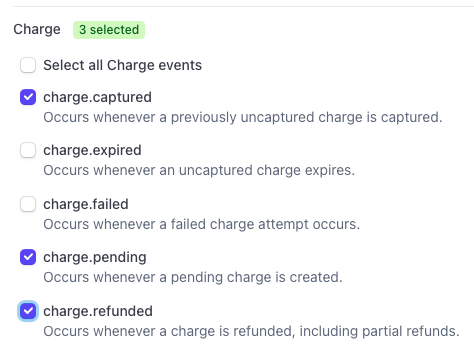Stripe Card Collections
Stripe Collection Module template on GithubRoot offers a preconfigured Stripe Collection Module Template to help you get started quickly with your build. Clone it from Github to get started.
Creating a new Stripe webhook
Get a collection module token
In order to create the webhook on Stripe, we need an endpoint on Root that Stripe can hit.
To create this, we first need a token for the collection module.
curl -XPOST -H 'Authorization: Basic {{authToken}}' -d '{
"description": "Collection module webhook for Stripe to hit",
}' '{{host}}/v1/apps/{{org_id}}/insurance/collection-modules/{{collection_module_key}}/tokens'Use your login token from the Root platform as the username. This can be retrieved from your cookies in the browser, or by hitting the login endpoint on Root.
If this is successful, you should receive a response like this:
Copy the secret for later.
{
"collection_module_token_id": "00000000-c164-4d0f-af25-7485c41b29fc",
"collection_module_id": "00000000-2ec3-4034-a9e3-93ade71a4907",
"description": "Collection module webhook for Stripe to hit",
"created_at": "2024-05-28T13:48:00.580Z",
"created_by": {
"type": "user",
"id": "be30701a-b0fa-43d2-a261-9ced8239191e"
},
"secret": "cm_sandbox_ODdm..."
}Create the webhook on Stripe
- Login to Stripe
- Select the "Developers" button on the top right.
- Ensure you are in the correct mode. "Test mode" is probably where you want to be.
- Go to webhooks and add a new endpoint

The endpoint URL is {{host}}/v1/insurance/collection-modules/{{secret}}/webhook
e.g: https://sandbox.uk.rootplatform.com/v1/insurance/collection-modules/cm_sandbox_xxx/webhook
- Select the events you would like to listen to


- Once you have selected all the events, take note of them, because we will need the event keys when handling them in our collection module.
- Be sure to click "Add events".
- Once you are done - click "Add endpoint".
Handling events in collection module
All of these events need to be handled in our collection module.
When the events are triggered, Stripe will hit our webhook endpoint with a payload. We need to handle that payload appropriately.
In your collection module, navigate to the webhook-hooks file.
Here you should have a processWebhookRequest function. This is where the webhook request will be handled.
Each event should be handled here.
Example:
const payload = parsedBody.data.object;
switch (parsedBody.type) {
case StripeEvents.InvoiceCreated: {
await new ProcessInvoiceCreatedEventController(
environment as Environment, // TODO: Remove all instances of environment - replace with global
).process(payload as Stripe.Invoice);
break;
}
case StripeEvents.InvoicePaid: {
await new ProcessInvoicePaidEventController(
environment as Environment,
).process(payload as Stripe.Invoice);
break;
}
case StripeEvents.InvoicePaymentFailed: {
await new ProcessInvoicePaymentFailedEventController(
environment as Environment,
).process(payload as Stripe.Invoice);
}
case StripeEvents.SubscriptionScheduleUpdated: {
await new ProcessSubscriptionScheduleUpdatedEventController(
environment as Environment,
).process(payload as Stripe.SubscriptionSchedule);
}
case StripeEvents.InvoiceVoided:
case StripeEvents.InvoiceMarkedUncollectible: {
await new ProcessInvoiceMarkedUncollectableEventController().process(
payload as Stripe.Invoice,
);
}
case StripeEvents.ChargeRefunded: {
await new ProcessInvoiceChargeRefundedEventController(
environment as Environment,
).process(payload as Stripe.Charge);
break;
}
case StripeEvents.PaymentIntentSucceeded: {
await new ProcessPaymentIntentSucceededEventController(
environment as Environment,
).process(payload as Stripe.PaymentIntent);
}
default:
// Unexpected event type
throw new Error(
`[${environment}] Collection module does not handle event type '${parsedBody.type}'.`,
);
}
return {
response: {
status: 200,
headers: { 'Content-Type': 'application/json' },
body: JSON.stringify({}),
},
};Setting environment variables in collection modules and where to find them
In order for the collection module to work with Stripe, we need to update a couple of environment variables which will be used in your code. These variables can all be set in the config.ts file.
Key | Description | Example |
|---|---|---|
STRIPE_API_KEY | Found under the API keys tab. Used to authenticate with the Stripe SDK. |
|
STRIPE_PRODUCT_ID | Found under the products tab. |
|
STRIPE_WEBHOOK_SIGNING_SECRET | The Stripe webhook signing secret. Used to authorize requests from Stripe. See |
|
STRIPE_PUBLISHABLE_KEY_LIVE | The Stripe publishable key. This is used when rendering the Stripe card details form. |
|
Push and Publish the collection module
Once the environment variables have been configured, be sure to rp push and publish your collection module.
Publishing Collection Modules
Publishing collection modules through the CLI (rp publish) is not currently supported.
🔹 To publish your collection module in sandbox or production, use the API:
API Endpoint:
POST {{host}}/v1/apps/{{org_id}}/insurance/collection-modules/{{cm_key}}/publish?bumpSandbox=trueNext Steps:
1️⃣ Execute the above API request using curl, Postman, or your preferred API tool.
2️⃣ Ensure that your module is fully configured and validated before publishing.
3️⃣ If you encounter issues, refer to the documentation or contact support.
📩 Need Help? Contact [email protected].
Updated 12 days ago